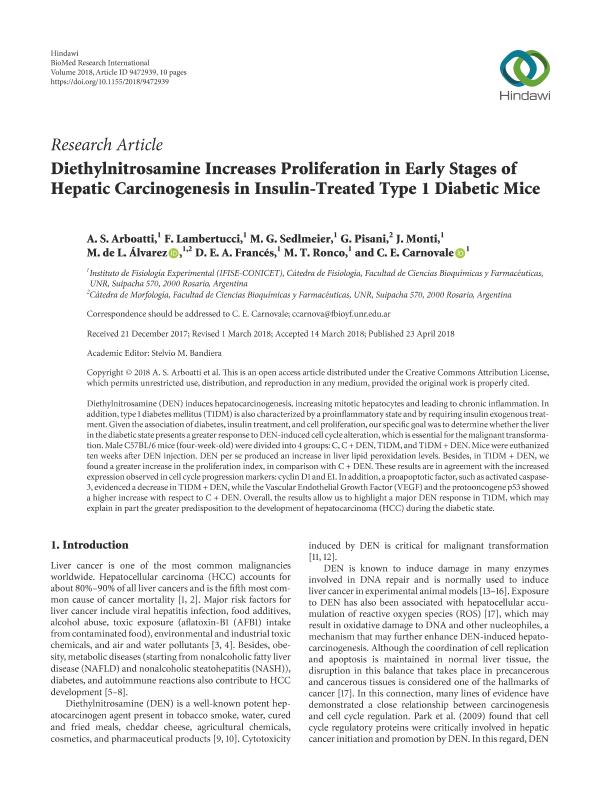Artículo
Diethylnitrosamine Increases Proliferation in Early Stages of Hepatic Carcinogenesis in Insulin-Treated Type 1 Diabetic Mice
Arboatti, Ainelén Soledad ; Lambertucci, Flavia
; Lambertucci, Flavia ; Sedlmeier, María Guillermina
; Sedlmeier, María Guillermina ; Pisani, Gerardo Bruno; Monti, Juan Alberto; Alvarez, María de Luján
; Pisani, Gerardo Bruno; Monti, Juan Alberto; Alvarez, María de Luján ; Frances, Daniel Eleazar Antonio
; Frances, Daniel Eleazar Antonio ; Ronco, Maria Teresa
; Ronco, Maria Teresa ; Carnovale, Cristina Ester
; Carnovale, Cristina Ester
 ; Lambertucci, Flavia
; Lambertucci, Flavia ; Sedlmeier, María Guillermina
; Sedlmeier, María Guillermina ; Pisani, Gerardo Bruno; Monti, Juan Alberto; Alvarez, María de Luján
; Pisani, Gerardo Bruno; Monti, Juan Alberto; Alvarez, María de Luján ; Frances, Daniel Eleazar Antonio
; Frances, Daniel Eleazar Antonio ; Ronco, Maria Teresa
; Ronco, Maria Teresa ; Carnovale, Cristina Ester
; Carnovale, Cristina Ester
Fecha de publicación:
04/2018
Editorial:
Hindawi Publishing Corporation
Revista:
BioMed Research International
ISSN:
2314-6141
Idioma:
Inglés
Tipo de recurso:
Artículo publicado
Clasificación temática:
Resumen
Diethylnitrosamine (DEN) induces hepatocarcinogenesis, increasing mitotic hepatocytes and leading to chronic inflammation. In addition, type 1 diabetes mellitus (T1DM) is also characterized by a proinflammatory state and by requiring insulin exogenous treatment. Given the association of diabetes, insulin treatment, and cell proliferation, our specific goal was to determine whether the liver in the diabetic state presents a greater response to DEN-induced cell cycle alteration, which is essential for the malignant transformation. Male C57BL/6 mice (four-week-old) were divided into 4 groups: C, C + DEN, T1DM, and T1DM + DEN. Mice were euthanized ten weeks after DEN injection. DEN per se produced an increase in liver lipid peroxidation levels. Besides, in T1DM + DEN, we found a greater increase in the proliferation index, in comparison with C + DEN. These results are in agreement with the increased expression observed in cell cycle progression markers: cyclin D1 and E1. In addition, a proapoptotic factor, such as activated caspase-3, evidenced a decrease in T1DM + DEN, while the Vascular Endothelial Growth Factor (VEGF) and the protooncogene p53 showed a higher increase with respect to C + DEN. Overall, the results allow us to highlight a major DEN response in T1DM, which may explain in part the greater predisposition to the development of hepatocarcinoma (HCC) during the diabetic state.
Palabras clave:
DEN
,
TYPE 1 DIABETES
,
HCC
,
LIVER
Archivos asociados
Licencia
Identificadores
Colecciones
Articulos(IFISE)
Articulos de INST.DE FISIOLOGIA EXPERIMENTAL (I)
Articulos de INST.DE FISIOLOGIA EXPERIMENTAL (I)
Citación
Arboatti, Ainelén Soledad; Lambertucci, Flavia; Sedlmeier, María Guillermina; Pisani, Gerardo Bruno; Monti, Juan Alberto; et al.; Diethylnitrosamine Increases Proliferation in Early Stages of Hepatic Carcinogenesis in Insulin-Treated Type 1 Diabetic Mice; Hindawi Publishing Corporation; BioMed Research International; 2018; 4-2018; 1-11
Compartir
Altmétricas



